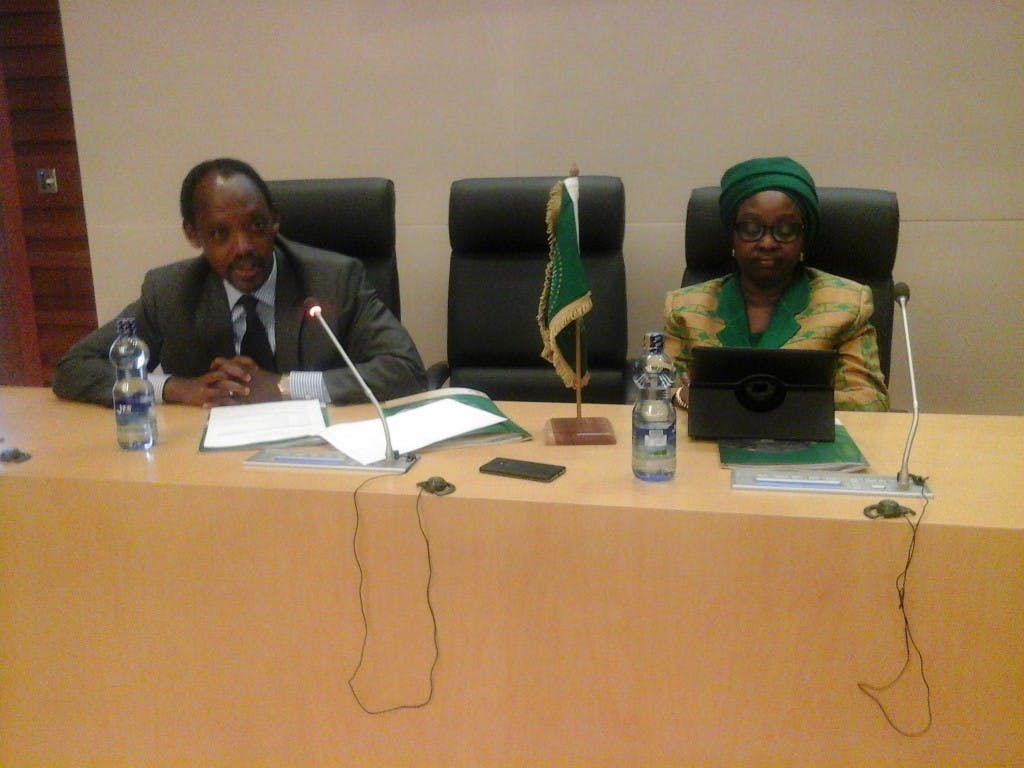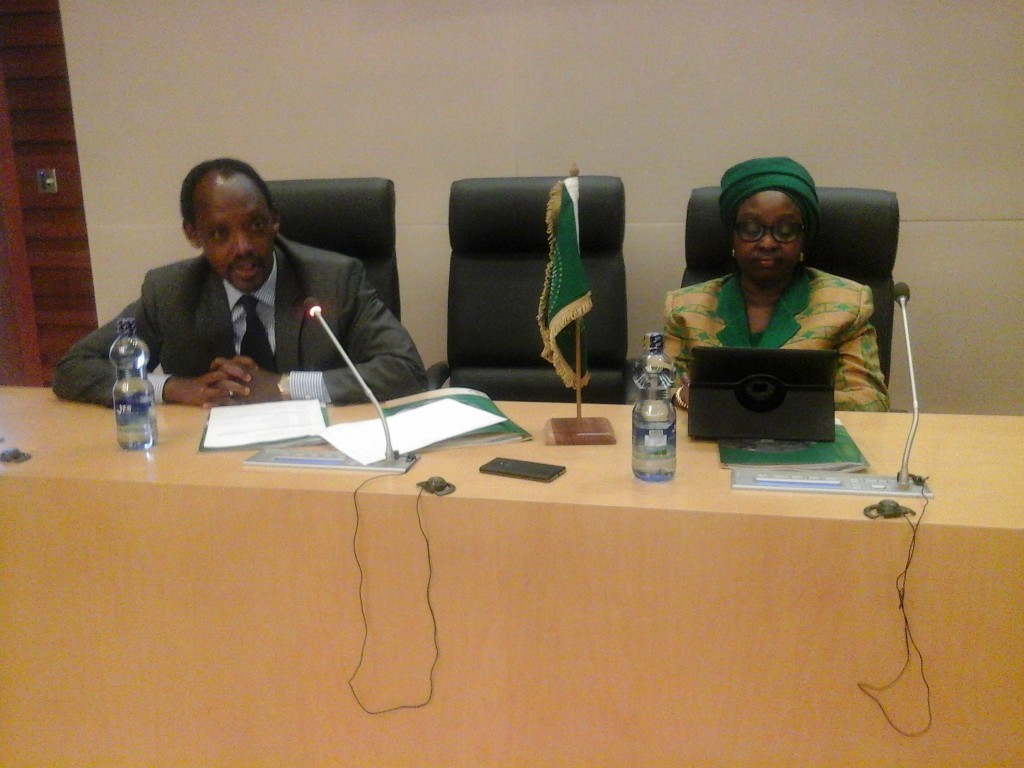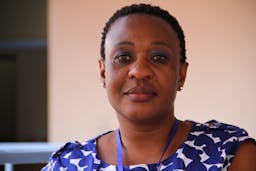FACE TO FACE WITH THE AU SPECIAL ENVOY ON WOMEN, PEACE AND SECURITY Mme BINETA DIOP
Jan 21, 2015
Story


Dear Madam Christine Musisi
I write you from the new African Union (AU) building, an architectural marvel that dominates the skyline of Addis Ababa. I am sitting directly opposite to Madam Bineta Diop. Madam Diop is the Special Envoy (SE) on Women, Peace and Security appointed at the January 2014 Summit in Addis Ababa by the AU Commissioner Madam Nkosazana Dhlamini Zuma, in line with her vision “to ensure that the voices of women and the vulnerable are heard much more clearly in peace building and in conflict resolution."
Today’s occasion is the SE’s consultation meeting with women’s groups and experts from Africa. The event is deliberately and strategically positioned in the margins of the Open Session on Women, Peace and Security within the Peace and Security Council debate on “Sources of Instability in Africa; Root Causes and Responses,” to be held on the 16th of December 2014 at the same venue. The consultation meeting is organised within the rubric of the multiple challenges African women face in the area of peace building in Africa, and also seeks to strategically connect women working on gender peace and security to the AU Peace and Security Council (PSC). It brings together African women networks, experts and partners in women peace and security from all parts of the continent, and also from the United Nations. I sit here representing one of your Eastern African Country Offices, the UN Women office in Zimbabwe. I told Madam Diop that I also represent my fellow women from the Zimbabwean women’s movement and the informal market women traders that I work with in Epworth, a peri-urban village near Harare.
Madam Diop works under the AU Chairperson’s specific leadership and in collaboration with the Commissioner for Peace and Security with the support of the Peace and Security Department of the African Union. Her mandate is to promote the protection and advancement of the rights of women and children, in particular those affected by violent conflicts in Africa; to promote the efforts to ensure that women play an active part in conflict prevention, resolution and peace-building; and to support other departments at the African Union to mainstream gender into the African Peace and Security Architecture (APSA) and the African Governance Architecture. Her office - the office of the SE, recognizes the challenges ranging from low levels of women representation and absence of gender structures within institutions to sexual and gender based violence against women during conflict and post conflict periods. This office is cognizant that women networks are key partners in the effort of creating an inclusive and gender sensitive peace building process.
I am awed by the special envoy’s modesty juxtaposed to her deep, wide and high levels of knowledge and skills on the peace and security subject exhibited throughout her engagements with us. It was indeed a timely idea for Madam Nkosazana Zuma to appoint this special envoy, and judging from her projections for her mission in this office, the AU Chairperson’s vision and agenda for the women of Africa is well represented now and in the future.
You will marvel at the SE’s achievements so far madam. Women leaders are indeed action oriented and transformational, and it will take only ten more like her in each country for us to build the Africa we want to see and live in. Since her appointment, she has spearheaded the process of raising voices and concerns of women, working closely with the various departments of the AUC, and putting effort in cultivating good relationship with various stakeholders and partners outside the AU as well. She has conducted a mapping of the AU by holding several meetings with different departments and divisions between 7-14th March and 1-5th April 2014, an opportunity that served to introduce the mandate and understand the overall operation of AU’s departments and partner’s support. She discussed the roles and responsibilities of APSA with respective actors, and undertook various initiatives undertaken that saw to the production of documents to further operationalize the mandate and implement the activities. Would you believe that Madam Diop has participated in solidarity missions in the Central African Republic, Somalia, South Sudan and Nigeria, focusing attention on key concerns of women in conflict situations? She narrated her encounter with massively displaced women concentrated in UN refugee camps in South Sudan, how women are targeted and kept in fear by El Shabaab in Somalia, and how Boko Haram denies the rights of girls to be educated in Nigeria. When she narrated how she held meetings and conversations with mothers of abducted girls Nigeria we were all moved to tears. These girls are now allegedly being used to carry and detonate suicide bombs. She noted how this new phenomena of extremism is ruining strides to bring peace on the continent.
We spent the first day of our meeting in serious high level consultation consisting of a series of panels focusing on experience sharing, presentations, and parallel working groups to address specific issues in line with the objectives and expected outcomes. Specifically the discussions addressed and targeted issues related to the vulnerabilities and challenges faced by women in conflict situation as well as their role in building peace across the continent, outcomes of which will be presented to the Open session of the PSC on 16 December 2014. Same outcomes will also constitute key inputs for the implementation of the mandate of the SE and in general for frameworks and mechanisms within the AU Commission that are particularly related to women, peace and security.
Expected outcomes of the consultation include: An understanding of women’s status and their role in peace processes; Strong partnership with partners working on issues related to women, peace and security; Concrete recommendations for the mandate and office of the SE; Strategies and roadmap to build a continental women, peace and security framework and accelerate the implementation of continental commitments on women, peace and security and Document Best practices and way forward.
During the group discussion I had occasion to share with colleagues how UN Women is supporting the effective implementation of international gender and security provisions and the response to gender insecurities as well as contributing to the prevention of gender-based violence and violence against women through the Zimbabwe Country Office’s Gender, Peace and Security project. I explained to them that our five year Norway funded project has over the past two years focused at enhancing support to key Government and non-government partners on strengthening capacities to respond to gender, peace and security concerns in the country through three identified focus areas namely: (i) women’s participation at all levels of peace and security policy making; (ii) strengthening capacities of security sector actors to respond to gender insecurities and (iii) supporting mechanisms for peace building at the community level. I briefed them on our training courses on Transformational Leadership, Conflict Analysis and Conflict Mediation held at three tiers in partnership with the African Centre for Transformation Leadership in Kenyatta University for women political leaders from the three major political parties in Zimbabwe; our gender mainstreaming initiatives with the police and prisons and correctional services; our gender mainstreaming initiatives in the curricula of security sector institutions in Zimbabwe and the ensuing knowledge products and model gender sensitive curricula already adopted for implementation in both private and government institutions of higher learning; our two studies and ensuing knowledge products on women’s roles in peace-building in Zimbabwe and on assessing the gaps security sector laws and policies; our capacity building initiatives and training on Transformational Leadership for the Group of Twenty, a women’s organ bringing together women parliamentarians, civil society and women from the academia to provide watchdog services and oversight on gender equality and women’s rights in all governance and peace-building processes; and finally our partnerships with the Women’s Coalition of Zimbabwe, the umbrella body for the women’s movement in Zimbabwe which has seen to the establishment of women’s peace committees, training of peace journalists and publishing of peace newspapers for dialogue and dissemination throughout the country. All this being said madam, the existing opportunities for possible fruitful partnerships between UN Women and the office of the AU Special Envoy on Women, Peace and Security are yours to assess and sanction. I write knowing that you will convey this message to Madam Phumzile Mlambo-Ngcuka, our Executive Director.
I also got an opportunity to present my group’s findings in plenary, but before I presented I took the SE and all participants through a breathing session, one of the methodologies I learnt from the Just Associates feminist processes which is fundamental for keeping women’s hearts, minds and bodies in one piece in the face of challenges and hard work. I did this deliberately as a way of emphasising the value of politicising women’s bodies and placing them at the centre of organising for gender equality and women’s empowerment.
Before I sign off madam, allow me to ‘politically exhibit’ my marvel at the new AU building where we are housed for this consultative meeting. I am told this massive building was a two hundred million dollar ‘free gift’ to Africa, courtesy of the Chinese. It is also true that Chinese cars are being made in Ethiopian factories, and that China is also building a light railway across Addis Ababa. I was looking at some trade figures and I learnt that by the year 2011 alone trade between China and Africa had increased more than six-fold to $120bn (£76bn). I have just sent a picture of new AU building via a group chat WhatsApp platform to 25 members of my women’s peace circle back home in Zimbabwe. They are all informal traders in the open market who are very keen on understanding initiatives for peace. I told them that this massive building was freely made possible by the Chinese. They all sent back their comments, marvel after marvel, but of interest was Nyari’s comment. Nyari is an intelligent young and graduate nurse selling on the informal traders’ open market because she cannot find a job. Her chat reads, “If only Madam Nkosazana Zuma could influence the Chinese political advisor to place gender equality in all governance processes in African states as a condition for continued relationships between Africa and China, all our member states would wake up with equal numbers of women and men in all their cabinets and parliaments.” I laughed after reading it, but at the back of mind still rings the seriousness of this matter. I wrote back to them and quickly pointed out that this will never happen because in exchange for these massive constructions, China also has our natural resources to exploit and export at easier than easy terms.
I am sorry for digressing Madam, and for taking so much time off your busy schedule, but as women we keep praying that the slow colonisation by the Asians will not be as painful on us as the Western colonialism that Africa has managed to conquer, except for its ugly legacies whose effects we are still travailing from. We hope that the Chinese agenda will not deter achievement of Agenda 2063 because we truly want to see the dawn of the Confederation of the African States.
It is my hope that both yourself and the UN Women Policy Advisor on Politics and Governance madam Florence Butegwa have recovered from the long hours of hard work during the training of the members of the G20 in Zimbabwe recently. When Madam Diop spent the whole day in session with us today I was quick to note the timbre between her leadership style and the one exhibited by you two in Zimbabwe. Madam Diop spent the day in session side by side with Dr Jean-Bosco Butera, her Special Adviser and Head of Office, and together they were a true microcosm of the UN 'He for She' Campaign. Africa needs a coalescence of effort between women and men for success, but mostly a crop of men that appreciates and willingly pushes the women’s emancipation agenda like Dr Butera.
Thank you Madam and best regards,
Dudzi




